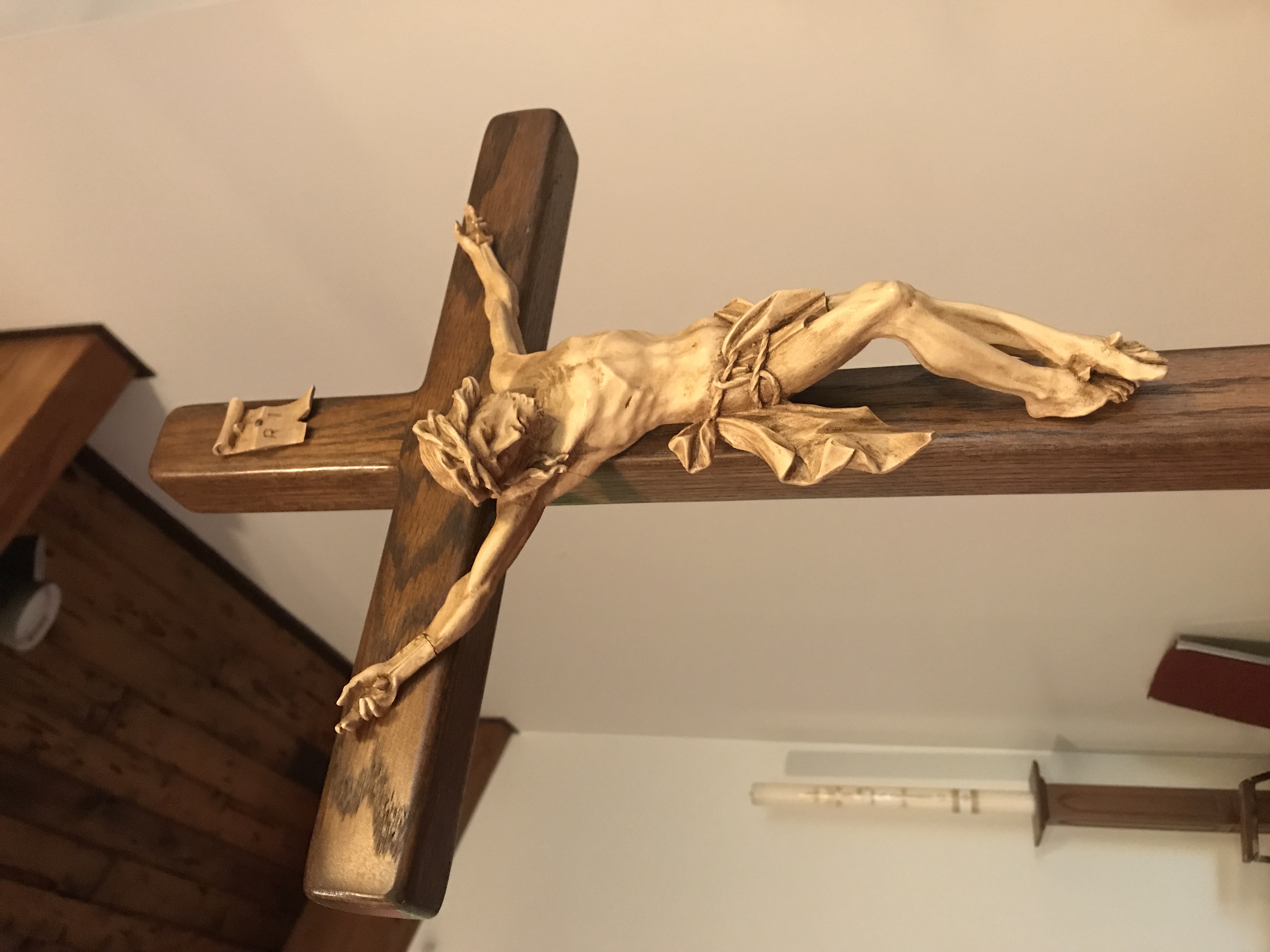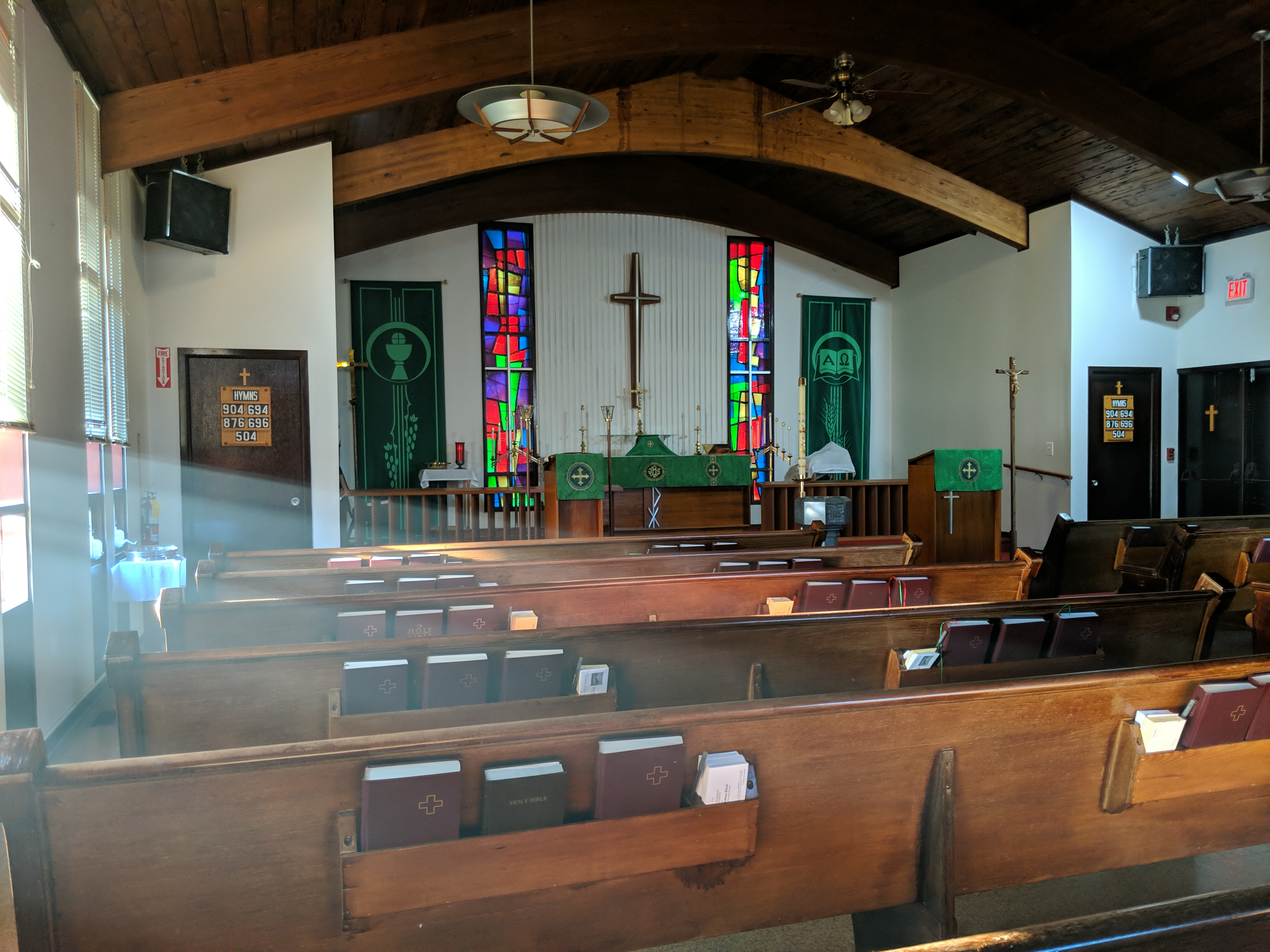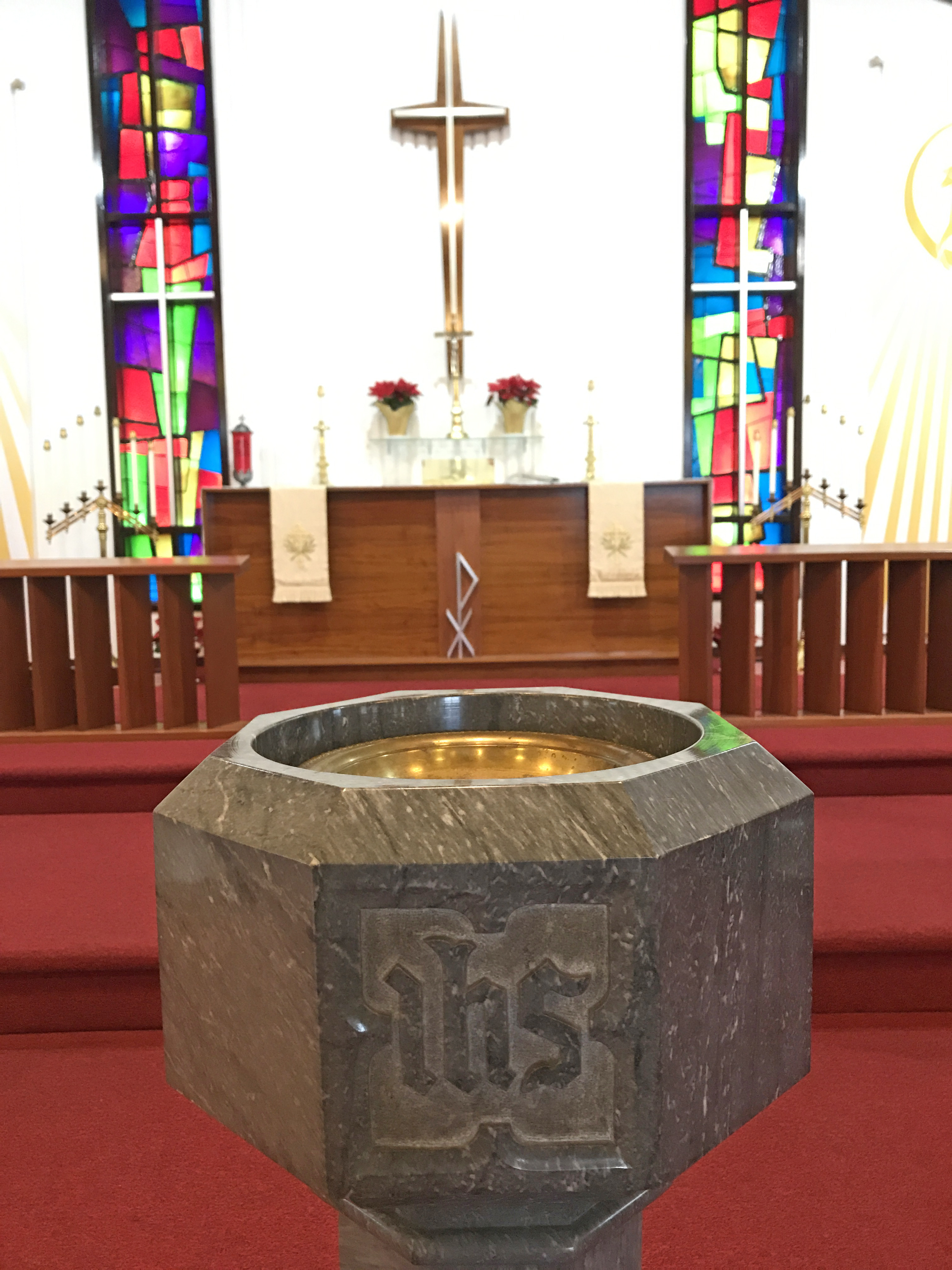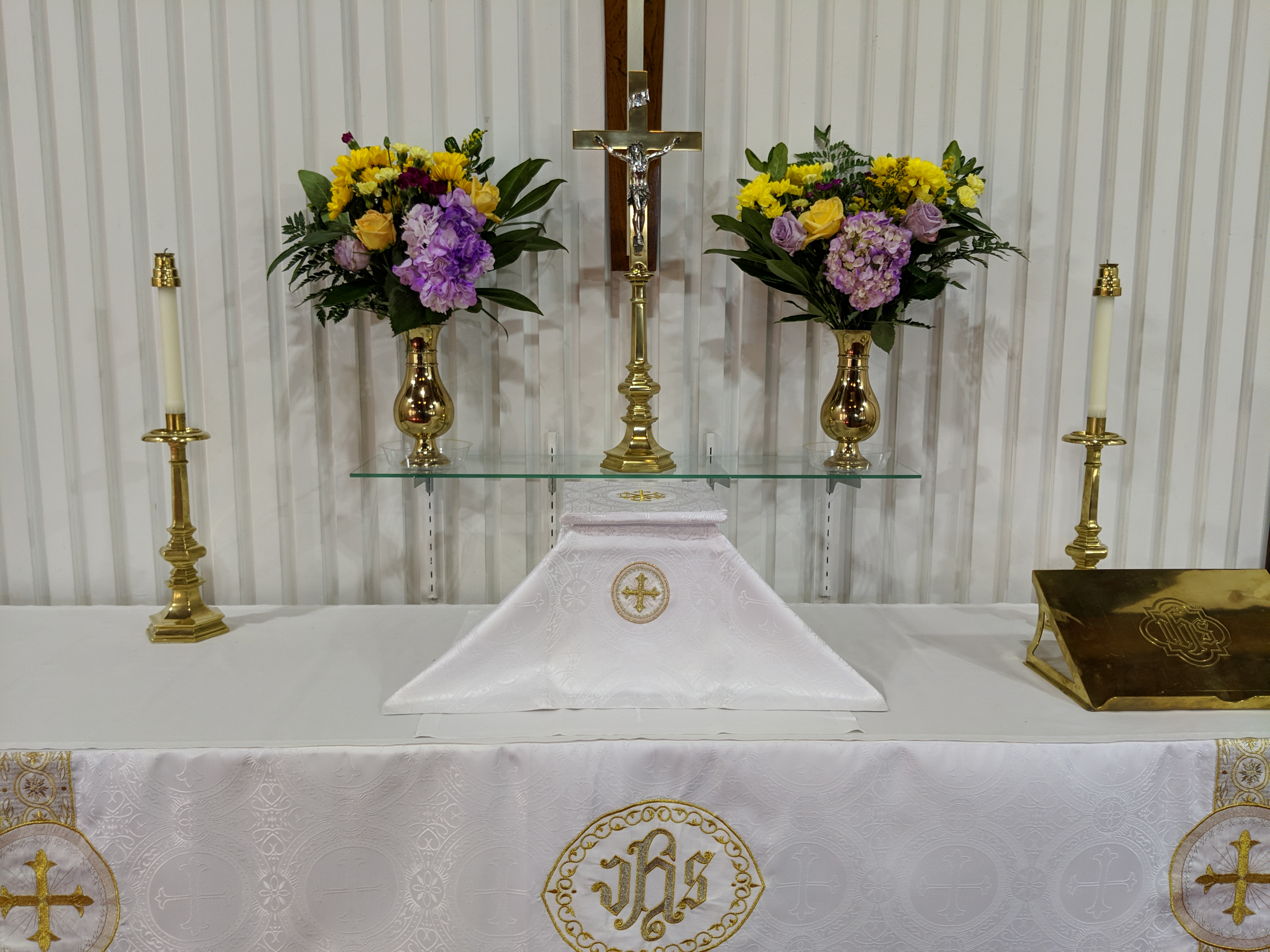The First Sunday after Christmas – Sunday 31 December A✠D 2023
✠ Psalmody: Psalm 93:5, 2; 1, 3–4;45:2a, 1b;93:1
✠ Lection: Jeremiah 31:31-34;Galatians 4:1–7;St. Luke 2:33-40
In the Name of the Father and of the ✠ Son and of the Holy Spirit. Amen.
Christmastime is not immune to controversy nor to conflict. Overall, most people tend to be nicer, more giving, jollier than at other times of the year, yet we know, some by very close and personal experience, that controversy and conflict can happen anywhere and anytime people are involved. As we have heard, so have we seen that we have the most certain Reason, the eternal One come down from heaven, by which to rejoice always, especially as we praise Jesus at His birth. The Truth from heaven is joyous even in the midst all conflicts. That is His goal: to come, to save, to bring joy to dead hearts, to reconcile us to God and to one another. We continue to remember and celebrate accordingly on this seventh day of Christmas thinking of that precious Babe lying in a manger. By the words of St. Simeon, we are blessed two-fold in this way:
First, just before today’s Gospel, he gives to us the words we will read and ponder upon on February 2nd, 40 days after Christmas, when we celebrate Candlemas and proclaim the words inspired in our dear brother by the Holy Spirit; words that we sing in thanksgiving to the Lord after every reception of Holy Communion: the Nunc Dimittis. At any point in this life, the Christian may depart in peace.
Second, in our text for this first Sunday after Christmas, we hear what else St. Simeon said after Joseph and Mary marveled at those things which were spoken of Jesus in the Nunc Dimittis. He blessed the holy parents and spoke controversial words, words that we, in our presents, cookies, and eggnog state of mind, don’t particularly want to encounter when we’re enjoying the warm, fuzzy thoughts about baby Jesus and O Little Town of Bethlehem. It’s because we’ve been conditioned to despise conflict to the point of avoiding it at nearly all costs. The problem with that is that when sinners try to live life together, there will be controversy and conflict. It’s how we internally handle conflict that can ultimately determine how much we go on to avoid it or seek to solve it. Godly resolution comes through those in conflict first denying oneself, especially all semblance of vengeance, and then agreeing that resolution is the goal, even if it costs us something like our pride. Conflict is obviously challenging, yet properly handled is one of the afflictions of this sinful life by which God grows us in sacrificial faith and love for one another.
In these two gifts of St. Simeon, we have the celebration of Christmas and the Sunday after. We have the warm, cuddly, cozy, jolly, merry thoughts of the glory of the Lord shining about the shepherds in the dark fields; the Light shining in the darkness of this world by the Word becoming flesh and dwelling among us; a Light to lighten the Gentiles and to shine forth as the glory of His people Israel, for Salvation unto us has come. And we also have the sobering, solemn words that this Infant holy, Infant lowly, this Christ Child, this little Babe is destined for the fall and rising of many and for a sign which will be spoken against, that the hearts of many may be revealed. Conflict in the heart as it lays exposed before its Creator is the unavoidable one that lies on the path to eternal life.
Likewise, even St. Luke the Evangelist points out the contrast of two signs, between the meekness of a newborn Child and the sharpness of the piercing of souls by the same One. We were told with the shepherds that the sign that a Savior had been born unto us in the city of David was that they would find a Babe wrapped in swaddling cloths, lying in a manger. By that, we embrace the peace on earth and good will toward men that this Child brings in reconciling sinners to God.
Luke’s second sign comes by St. Simeon’s words: the fall and rising of many, souls pierced through by sword; and the thoughts of hearts revealed. This is our most necessary controversy, and one that brings conflict out of necessity. When the Light of the World comes into the world, it is joyous for those who do receive Him and believe in His Name. But even for believers being brought to that point, and living a true life of faith in God, it is an existence that stirs up that necessary controversy within.
Whether it be to the world or to our sinful, desiring-to-unbelieve flesh, it is first controversial to us all that God became Man. The eternal, almighty One of heaven became one of us. It is good that you are thankful that this is true as you sit in His house in Christmastide worshiping Him, but do not overlook the pride of your flesh or how much you may be tempted to discount this miracle. It’s humbling to us that God became Man. The reason why it’s humbling and why it’s controversial to all fallen humanity is that in God becoming one of us, He makes it perfectly clear that He came to do what humanity cannot. Good, honest hard work usually pays off, especially in this nation, at least for now. But no matter how hard we try, no matter how much good we can strive to do, we can’t overcome our most wretched condition that saturates our entire human nature: sinfulness. We highly value being independent, not depending upon or asking one another for anything so that we can show others and ourselves that we shall be a burden to no one and can provide all the help for ourselves that we need. God becoming Man to do what humanity cannot is an appropriately righteous slap in the face of all parts of us that may think that we come to God, that we are saved, that we remain saved, by our abilities. That is necessary controversy and conflict and one that is put before the face of all people when the pure Gospel is preached, for the pure Gospel does not go forth unaccompanied by God’s perfect and holy Law.
This holy Child taken up into St. Simeon’s arms is also controversial in that His story doesn’t end in a plush baby blue nursery, but continues on for 33 years that end in suffering and death by execution by that same humanity that He comes to save. God cannot suffer, for who is His superior that he may inflict such a thing on the omnipotent One? And yet we confess what the Scriptures do, that God suffered under Pontius Pilate, was crucified, died and was buried. The only way this can be true is if the Lord humbled Himself, took upon Himself a form that could suffer, a form that could die. Our humanity is that very thing. We need not be troubled as the world is by saying that God suffered and died for sinners, for that He thankfully did. But His suffering and death could only come by His divine nature joining inseparably with our human nature, so that in the one Person, Jesus Christ our Lord, both God and Man, the satisfactory death could happen to God on our behalf. Jesus suffered and died for all sins and for all sinners so that we may die to self and follow His example of loving God and neighbor, especially when our hearts want to turn away from one another when there’s conflict. In Christ is there not only forgiveness, but courage, wisdom, and protection in all things we encounter, including very difficult interactions. Oh, how good it is when He is the common foundation.
Yet the greatest controversy and conflict in dealing with this Holy Child is in the settling of accounts. We do well in this life by rendering to all their due: taxes to whom taxes are due, customs to whom customs, fear to whom fear, honor to whom honor. For the sake of good stewardship, we seek to be repaid what we have given in agreed loan. Likewise, when we buy something, especially something expensive, we expect to receive that for which we have paid. We also try to avoid personal debt, only make use of it when necessary, and ensure that we pay back what is charged against us. But there’s debt that not even the nicest, hardest working among us could repay. Every one of our sins is an offense, a charge by God against us, a debt that requires repayment. A single sin is enough evil to condemn for all eternity and we accumulate countless lifetime quantities’ of them in our breath of existence here. And what do we see in this great and mighty wonder of a Child, Who is both God and Man? We see the payment coming to be made. We see that He has come to give eternal life freely, without us contributing anything at all in order to obtain it. Salvation unto us has come…freely, as Gift of pure grace; undeserved, yet given; unattainable, yet gained; unimaginable, yet known. He obeys in our stead. He suffers in our stead, settling the conflict between us and God. All His righteousness, He gives. All our condemnation, He takes. It ain’t fair. It ain’t fair to Him. For us, it blows fairness out of the water, for deserving hell, we gain heaven. Deserving death, He gives Life. It doesn’t compute by earthly, fair standards, yet to attain the glory of the promise of eternal life, we shall boldly face conflicts that come about, especially the ones that this Child brings internally as we ponder more how the Holy God could become one of us to save us from the sins that are no one else’s but our own. It’s not fair to Him that He would take them all upon Himself, yet He has. For this, we must believe Him. For this, we must trust Him. For this, we must thank Him, for if He does not take every one of our sins upon Himself, we are utterly lost. There is no option of us helping ourselves. No matter how earnestly or even piously we want to, we can’t.
This not-insignificant truth is beyond too-good-to-be-true. Only the Gospel of Jesus Christ exceeds that saying and establishes the blessed, eternal exception to the rule. Is it too good to us? Is He too good to us? For us? Yes, but it is also most certainly true that He is good to us in this eternal way of stepping down from on High to bring about peace by bringing about the sword that cuts to the heart. The fall and rising of many is that beautiful picture that we see in being baptized into Christ. Being therefore buried with Him through Baptism into death we fall. Our sins are condemned and we die with Him that we may live with Him. We examine ourselves and see that the sin accusation is true. We conflict with this hard truth because the Old Adam is wriggly old devil who doesn’t stay down under those waters long at all. The conflict is with our pride that neither wants to admit that we are sinful and unclean nor wants to acknowledge that we cannot save ourselves and it surely doesn’t want to bend the pride to admit that God had to come do what we cannot.
But in this same controversial Child, Who is that gracious, powerful God in human frailty, we are counted among those rising, among those receiving forgiveness that isn’t deserved. By His grace, we get to respond to the Child in the Manger with gladness and rejoicing. Then, He makes us ready, and hopefully willing, to bestow that same forgiveness in earthly conflicts is an invaluable step toward resolution, for such an unfair, purely gracious exchange is what reconciled us to God. So, if Christ is the sign to be spoken against, the Sign of eternal union with our humanity to save us, the Sign of God suffering in our stead, and the Sign of all the inheritance of heaven being gained freely by those undeserving of it for this Child’s sake, for our Christ’s sake, then let the same be spoken against us as we live in Him by the light and life that He brings to us. If it is possible, as much as depends on you, live peaceably with all men. Conflicts and controversy are part of this evil age, yet He Who was born lowly of the Blessed Virgin Mary, wrapped in swaddling cloths, laid in a manger, and then taken up to His holy temple to be confessed as our Redemption has overcome and settled your greatest conflict so that you may have confidence, courage, faith, and love in the midst of all the others that this life brings.
In ✠ Jesus’ Name. Amen.












Comments are closed, but trackbacks and pingbacks are open.